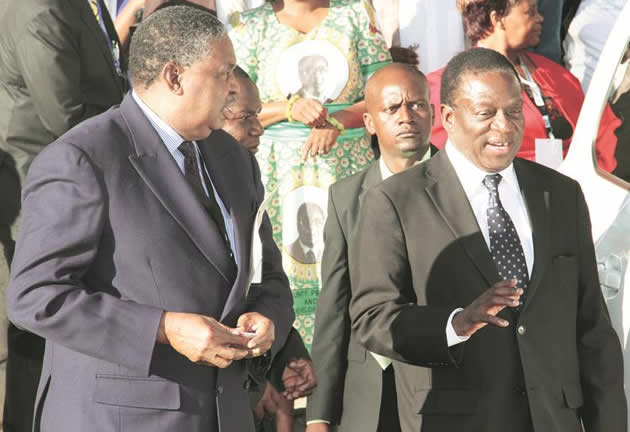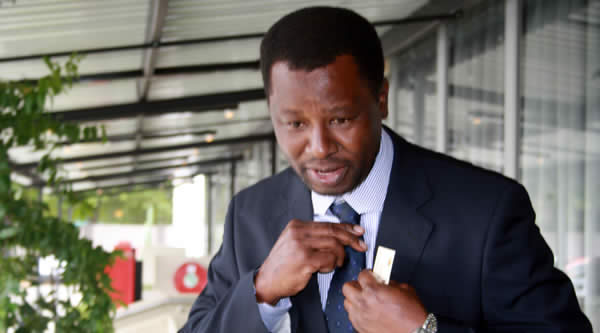Unpacking VPs and ministerial portfolios

Alex T. Magaisa Correspondent
THERE are a few constitutional questions that have arisen over the last couple of weeks and they require some commentary. The first is whether it is constitutionally permissible for a Vice President to also hold a ministerial portfolio at the same time. The second is whether it is constitutional and fair for a person who is elected by the people to lose a seat in Parliament simply because he or she has been appointed Vice President.
Finally, it has been asked whether the old Constitution still applies at all.
I will deal with each in turn.
When President Mugabe appointed the two Vice Presidents last week, he assigned a ministry to each of them. Under this arrangement Vice President Mnangagwa will retain his role as Minister of Justice, while his fellow VP, Mphoko was assigned a role in national healing and reconciliation. Members of the public have questioned whether this is constitutionally permissible, for a Vice President to also be in charge of a specific ministry.
My reading of the Constitution is that there is no constitutional barrier to this arrangement. All references to sections in this article will be in respect of the Constitution unless specifically stated otherwise.
The provision that most people have raised is s. 103 which provides that the President and his Vice Presidents must not, directly or indirectly, hold any other public office while they are in office.
A ministerial office falls within the definition of a “public office” under s. 332, which states that a public office is “a paid office in the service of the State”.
On a strict reading of s. 103, it would, therefore, appear that appointing a VP to a ministerial role would seem to be impermissible. However, in my opinion, s. 103 cannot and should not be read in isolation. There are other provisions that must be considered and it is to these provisions that I now turn.
In the first place, s. 99 which deals with the functions of Vice Presidents provides as follows:
“The Vice Presidents assist the President in the discharge of his or her functions and perform any other function, including the administration of any ministry, department or Act of Parliament, that the President may assign to them.”
This provision alone is very clear that the Vice Presidents may be assigned a ministry to administer. On that basis alone, there is nothing wrong with the arrangement where the current VPs have been assigned specific ministries to administer. The Constitution permits it. This may not be the ideal situation but the Constitution allows it.
Further and in any event, there is also s. 104(1) which provides that the President “… may reserve to himself or herself the administration of an Act, ministry or department”.
Since the Vice Presidents effectively assist the President in carrying out his functions, it could be argued that he could legally assign his lieutenants to administer whatever ministry or ministries that he would have reserved for his office under this provision.
In this case, it would be said that he reserved the Ministry of Justice and the Department of National Healing for himself and that further, he has delegated the functions to his Vice Presidents. This, in my opinion, would still be legal.
The second question is why should a Vice President who is also an MP lose his or her seat when appointed to the Vice Presidency? Why should an elected person lose his or her seat in this manner? The answer to this is very simple. This is what the law demands. That is what s. 129(1)(c.) states and the end of tenure is by operation of the law. If this is undemocratic, the only way to resolve it would be to amend the provision bto ut as long as it stands, it has to be followed.
In any event, there is nothing unfair here, in my opinion. If an MP who is offered the Vice Presidency does not want to lose their seat they have the option to refuse the appointment. The price that you pay for the appointment to the Vice Presidency is that you give up your seat in Parliament.
The idea is that you cannot be a VP for the whole country and yet still be an MP for a single constituency. I think that is fair on everyone. The same happens when a person becomes Speaker of the National Assembly or president of Senate – they lose their seat in terms of s. 129(1)(d.)
Some people have said that this provision has to be read along with s. 92 which provides for running mates and that it should not apply in situations where an MP is elevated to the Vice Presidency. This does not make sense.
If anything, s. 129(1)(c.) was created especially to apply to a situation where a new VP was an MP. Under the running mates provision, s. 129(1)(c.) would actually be redundant because by virtue of being running mates, such candidates are not and cannot be MPs.
When you choose to run for elections as a running mate to the Presidential candidate, you cannot run for a parliamentary seat. Thus s. 129(1)(c.) never applies to a Presidential system of running mates, except where the a new Vice President appointed to fill a vacancy where a Vice President has either been elevated, died, resigned or been removed in which case if the replacement was an MP, then he or she ceases to be an MP.
There is a further point which people are raising, which is a myth that must be dispelled once and for all. It is the view that there is a clause in the Constitution which provides that the maximum age-limit for a Vice President is 70 years. This is a myth. There is no such clause
As far as I am aware, this was proposed in the early drafts of the Constitution but it was heavily opposed. It had been argued that since there is a minimum age qualification of 40 years, then there should also be a maximum age limit.
However, there was a belief that this proposition was no more than a mechanism to disqualify President Mugabe, who was well above 70 years at the time. However, other politicians with presidential ambitions, on both sides of the political divide it has to be said, were uncomfortable with this clause as they realised it would soon catch up with them and debar them too, from contesting. Therefore, the clause suffered a stillbirth.
Finally, the Prosecutor-General was quoted as saying that the Vice Presidents were appointed under the old Constitution. I cannot understand where he got that idea from. The old Constitution is constitutionally dead and buried. It does not apply anymore. Section 2(2) of the Sixth Schedule is very clear on this where it states,
“Except as otherwise provided in this Schedule, the rest of this Constitution comes into operation on the day on which the President elected in the first elections assumes office.”
Other provisions had started operating on the publication day, May 22 2014, as set out in s. 2(3) of the Sixth Schedule. It is true that there are provisions that have been postponed for some time, such as the running mates’ clause or the composition of the Constitutional Court but the appointment of Vice Presidents is specifically provided for in s. 14(20 of the Sixth Schedule.
Clearly, if he was quoted correctly, the Prosecutor-General was wrong in this case. In future, I think the media should call for comments from the Acting Attorney-General, who is the principal legal advisor to Government in terms of s. 114 (4)(a) and I believe is better placed to comment on this civil issues.
The instance is also a reminder that Government should seriously consider ensuring that the appointment of a substantive Attorney-General is finalised. I believe the present Acting AG, Advocate Machaya, is a capable and well-respected man and there is no reason why that constitutional role is still vacant.
Dr Magaisa is a Zimbabwean lawyer currently based at the University of Kent and was a technical advisor to the team that wrote the new Constitution of Zimbabwe. He can be reached at [email protected]. Visit his blog at www.newzimbabweconstitution.wordpress.com









Comments